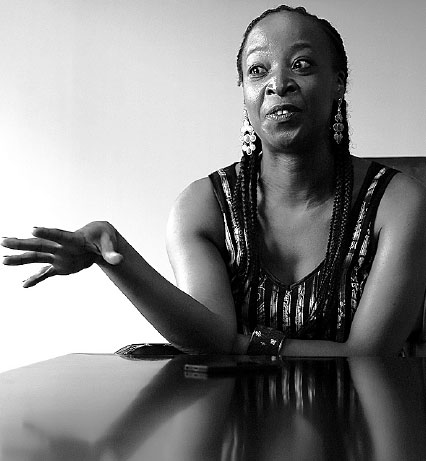South Africa's high crime rate inspires novelist
Novelist Angela Makholwa's fascination with South Africa's violent crime has made her one of the country's most popular writers.
Using sharply drawn characters and intriguing plots, Makholwa's fiction helps South Africans to make sense of the country's high crime rate. A mother of two who runs a public relations firm, Makholwa says she is inspired by the discomfort caused by crime.
"It's a permanent fixture of our lives. It's almost part of the fabric of what it is to be a South African," she says. "It's hard for me to write an idealized version of what it's like to live in Johannesburg or South Africa."
|
Angela Makholwa's fascination with South Africa's violent crime has made her one of the country's most popular writers. AP |
While working as a writer at a glossy magazine, Makholwa became fascinated by the case of a serial killer. For about a year, she interviewed the convict serving 2,410 years in a maximum security prison in Pretoria for the murder and rape of dozens of women. He was courteous, almost sweet, when talking about his life, she says.
The experience led to her first book, Red Ink, the story of a young journalist telling the story of a serial killer, who unwittingly finds herself at the center of a murder plot.
Her next novel, The Thirtieth Candle, traced the anxiety of four suburban South African women as they approached their 30th birthdays.
It was her third and most successful book that established Makholwa as a top crime writer. Black Widow Society tells the story of a covert cabal of powerful women who assassinate their abusive and wayward husbands.
She knew she got the story right when her own husband, a lawyer, says he was disturbed but entertained by her first draft, says Makholwa.
"Angela has a unique way of capturing modern South African society and in Black Widow Society the tables turn and women take control," says Terry Morris, managing director of Pan Macmillan, Makholwa's publisher.
Makholwa, a survivor of domestic violence in an earlier relationship, often explores gender disparities in her books. Her sophisticated and conniving heroines serve as a catharsis for her own experiences and subvert a genre that usually portrays women as victims.
Makholwa's characters are snappy and her descriptions of urban South Africa are vivid, say critics.
Makholwa has sold thousands of books and has a loyal following. In South Africa, the sale of 2,000 books is considered a best-seller.
The 38-year-old will not be "burdened" by the idea that she may be portraying an image of a crime-ridden country, she says it would be a "false picture" if a new generation of South African writers ignored crime.
Between April 2013 and March 2014 South Africa recorded 17,068 murders in a population of about 50 million, according to the South African police.
"Some of the crimes that happen here are sometimes so heinous that we're at a loss of how to process them," says Mary Corrigal, a book critic. "It keeps happening and we don't really understand why. The novel presents a space for writers to try and process crime in this country - this terrible phenomenon that holds our society to ransom."
In recent years, crime fiction has become an increasingly popular genre among South African authors and readers, and Corrigal says a common theme of disillusionment and corruption across South African crime fiction paints a "bleak view of society".
"Because the authority figures are corrupt, there's no real redemption," she says. "There's a lingering sense of disorder and chaos."
South Africa's fiction has historically been dominated by an image of a country gripped by racial segregation and conflict, and Makholwa says she is excited to be among a new generation of writers exploring a fresh story for an audience looking for entertainment, not only searching for a message about the past.
"Apartheid as a system was so oppressive that it was the only thing you could think about," says Makholwa. "As South Africans, as a society and as readers, we are maturing. We now truly have an audience that is reading for pleasure."



















